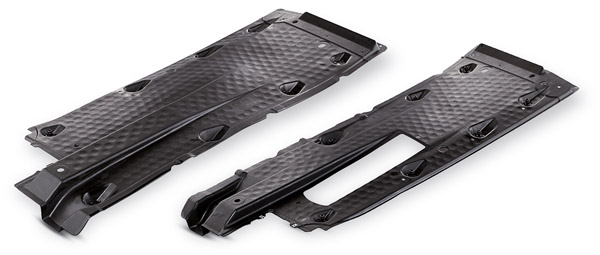AUTOMOTIVE MARKET
LFT PP demand growing in most applications / Increasing role in automotive design / AMI report
Demand for LFT (long-fibre thermoplastic) PP has been growing strongly in most automotive applications and in most regions of the world and is predicted to grow at double-digit rates during the coming years, according to the recently published multi-client study, titled “Long fibre polypropylene compounds”, from UK-based researcher AMI Consulting (Bristol; www.amiplastics.com).
The study provides a comprehensive analysis of LFT PP by application, OEM and geographical region and quantifies the use of both granule LFT PP (LFT-G) and direct compounding and moulding in-line of LFT PP (LFT-D), detailing its use vehicle-by-vehicle around the world. Until now, the penetration of LFT PP varied significantly by OEM in various applications and, as design experience builds, there is evidence that LFT PP will become a material of choice for automotive designers.
The study provides a comprehensive analysis of LFT PP by application, OEM and geographical region and quantifies the use of both granule LFT PP (LFT-G) and direct compounding and moulding in-line of LFT PP (LFT-D), detailing its use vehicle-by-vehicle around the world. Until now, the penetration of LFT PP varied significantly by OEM in various applications and, as design experience builds, there is evidence that LFT PP will become a material of choice for automotive designers.
 An example of a LFT-D PP moulding of under body shields made by Polytec for the VW group (Photo: Polytec) |
The report says that since the late 1990s LFT-G and LFT-D PP-based products have been gaining an increasing role in automotive design. LFT-G PP is made in conventional compounding equipment but with modified dies. The long fibre length is achieved by using either wire coating or pultrusion technology. There are a number of variants in the LFT-D process but fibre length is maintained because, rather than granulating the product, it moves through an open die directly into the mould. The first successful promoter of this technology was Dieffenbacher (Eppingen / Germany; www.dieffenbacher.de), which makes compression moulding machinery, but more recently KraussMaffei (Munich / Germany; www.krauss-maffei.de) has emerged as the largest supplier of in-line injection moulding machinery.
The in-line compression moulding process is particularly suitable for 2-D parts and the in-line injection moulding process suitable for more complex 3-D parts. LFT-D’s economic benefits lie where the moulder is producing high volumes of relatively large parts. In other circumstances LFT-G PP is the preferred choice, AMI said.
LFT PP is now used widely in automotive front-end carriers, instrument panel carriers, door panel supports, consoles, pedals, under body shields and a number of other applications. The material can replace either steel, reducing weight and improving fuel efficiency, or more expensive engineering plastics. The parts made in LFT PP are routinely so large that a moulding may weigh 3-4 kg although wall thicknesses below 1mm are found in some designs. An excellent example of LFT-D PP in practice is the under body shield moulded by Polytec (Hörsching / Austria; www.polytec-group.com) for the Volkswagen "A5/PQ35" platform, which includes the Audi "A3", VW "Golf", SEAT "León", Škoda "Octavia" and many other vehicles. The production plant in Germany has capacity to make 2.4m mouldings annually, enough to supply to VW plants making these models around the world.
The instrument panel carrier for the new BMW "7 Series" is made from an LFT-G grade supplied by Borealis (Vienna / Austria; www.borealisgroup.com). The LFT-G PP contains 20% glass fibre, whereas the same part on the previous model used a PPE/PS blend containing 10% glass fibre. The largest producers of LFT-G include Ticona (Kelsterbach / Germany; www.ticona.com) with its “Celstran” brand, Sabic (Riyadh / Saudi Arabia; www.sabic.com), which markets the product using both “Stamax” and “Verton” brands, and Chisso, now named JNC (Tokyo / Japan; www.chisso.co.jp).
Glass matt thermoplastic (GMT) is another long established PP-based product. The product is produced as a sheet and is typically shaped by compression moulding. The resulting product is very stiff and has been used quite extensively in applications such as under body shields and spare wheel wells. Among the best known GMT brand names are “Azdel”, from Azdel (Lynchburg, Virginia / USA; www.azdel.com), and “Symalit”, produced by Quadrant Engineering Plastic Products (Zurich / Switzerland; www.quadrant.ch).
25.08.2011 Plasteurope.com [220163-0]
Published on 25.08.2011
